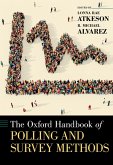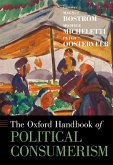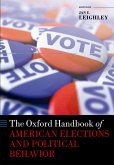The Oxford Handbook of Political Networks (eBook, PDF)
Redaktion: Victor, Jennifer Nicoll; Lubell, Mark; Montgomery, Alexander H.


Alle Infos zum eBook verschenken

The Oxford Handbook of Political Networks (eBook, PDF)
Redaktion: Victor, Jennifer Nicoll; Lubell, Mark; Montgomery, Alexander H.
- Format: PDF
- Merkliste
- Auf die Merkliste
- Bewerten Bewerten
- Teilen
- Produkt teilen
- Produkterinnerung
- Produkterinnerung

Hier können Sie sich einloggen

Bitte loggen Sie sich zunächst in Ihr Kundenkonto ein oder registrieren Sie sich bei bücher.de, um das eBook-Abo tolino select nutzen zu können.
Networks are omnipresent in our natural and social world, and they are at the heart of politics. Relationships of many types drive political institutions, processes, and decision-making. Therefore, it is imperative for the study of politics to include network approaches. Already, these approaches have advanced our understanding of critical questions, such as: Why do people vote? How can people build problem-solving coalitions? How can governments and organizations foster innovations? How can countries build ties that promote peace? What are the most fruitful strategies for disrupting arms or…mehr
- Geräte: PC
- mit Kopierschutz
- eBook Hilfe
- Größe: 59.44MB
![The Oxford Handbook of Electoral Systems (eBook, PDF) The Oxford Handbook of Electoral Systems (eBook, PDF)]() The Oxford Handbook of Electoral Systems (eBook, PDF)31,95 €
The Oxford Handbook of Electoral Systems (eBook, PDF)31,95 €![The Oxford Handbook of Polling and Survey Methods (eBook, PDF) The Oxford Handbook of Polling and Survey Methods (eBook, PDF)]() The Oxford Handbook of Polling and Survey Methods (eBook, PDF)96,95 €
The Oxford Handbook of Polling and Survey Methods (eBook, PDF)96,95 €![The Oxford Handbook of Turkish Politics (eBook, PDF) The Oxford Handbook of Turkish Politics (eBook, PDF)]() The Oxford Handbook of Turkish Politics (eBook, PDF)100,95 €
The Oxford Handbook of Turkish Politics (eBook, PDF)100,95 €![The Oxford Handbook of Political Consumerism (eBook, PDF) The Oxford Handbook of Political Consumerism (eBook, PDF)]() Magnus BoströmThe Oxford Handbook of Political Consumerism (eBook, PDF)98,95 €
Magnus BoströmThe Oxford Handbook of Political Consumerism (eBook, PDF)98,95 €![The Oxford Handbook of Electoral Persuasion (eBook, PDF) The Oxford Handbook of Electoral Persuasion (eBook, PDF)]() The Oxford Handbook of Electoral Persuasion (eBook, PDF)125,95 €
The Oxford Handbook of Electoral Persuasion (eBook, PDF)125,95 €![The Oxford Handbook of American Elections and Political Behavior (eBook, PDF) The Oxford Handbook of American Elections and Political Behavior (eBook, PDF)]() The Oxford Handbook of American Elections and Political Behavior (eBook, PDF)97,95 €
The Oxford Handbook of American Elections and Political Behavior (eBook, PDF)97,95 €![The Oxford Handbook of Israeli Politics and Society (eBook, PDF) The Oxford Handbook of Israeli Politics and Society (eBook, PDF)]() The Oxford Handbook of Israeli Politics and Society (eBook, PDF)85,95 €
The Oxford Handbook of Israeli Politics and Society (eBook, PDF)85,95 €-
-
-
Dieser Download kann aus rechtlichen Gründen nur mit Rechnungsadresse in A, B, BG, CY, CZ, D, DK, EW, E, FIN, F, GR, HR, H, IRL, I, LT, L, LR, M, NL, PL, P, R, S, SLO, SK ausgeliefert werden.
- Produktdetails
- Verlag: Oxford University Press
- Seitenzahl: 752
- Erscheinungstermin: 23. August 2017
- Englisch
- ISBN-13: 9780190228736
- Artikelnr.: 54574282
- Verlag: Oxford University Press
- Seitenzahl: 752
- Erscheinungstermin: 23. August 2017
- Englisch
- ISBN-13: 9780190228736
- Artikelnr.: 54574282
- Herstellerkennzeichnung Die Herstellerinformationen sind derzeit nicht verfügbar.
* Contributors
* Part 1: Network Theory and the Study of Politics
* 1. Introduction: The Emergence of the Study of Networks in Politics
* Jennifer Nicoll Victor, Alexander H. Montgomery, and Mark Lubell
* 2. The Emergence of Organizations and States
* John F. Padgett
* 3. Power Structures of Policy Networks
* David Knoke and Tetiana Kostiuchenko
* 4. Political Networks and Computational Social Science
* David Lazer and Stefan Wojcik
* 5. Causal Inference in Political Networks
* Jon C. Rogowski and Betsy Sinclair
* 6. Network Theory and Political Science
* John W. Patty and Elizabeth Maggie Penn
* Part 2: Political Network Methodologies
* 7. Relational Concepts, Measurement, and Data Collection
* Justin H. Gross and Joshua M. Jansa
* 8. Statistical Inference in Political Networks Research
* Bruce A. Desmarais and Skyler J. Cranmer
* 9. Stochastic Actor-Oriented Models for Network Dynamics
* Tom A.B. Snijders and Mark Pickup
* 10. Latent Networks and Spatial Networks in Politics
* Cassy Dorff, Shahryar Minhas, and Michael D. Ward
* 11. Visualization of Political Networks
* Jürgen Pfeffer
* 12. Discourse Network Analysis: Policy Debates as Dynamic Networks
* Philip Leifeld
* 13. Semantic Networks and Applications in Public Opinion Research
* Sijia Yang and Sandra Gonzalez-Bailon
* Part 3: Networks and American Politics
* 14. Voting and Participation
* Meredith Rolfe and Stephanie Chan
* 15. Social Networks and Vote Choice
* Lauren Ratliff Santoro and Paul A. Beck
* 16. Political Parties and Campaign Finance Networks
* Paul S. Herrnson and Justin H. Kirkland
* 17. A Network Approach to Interest Group Politics
* Michael T. Heaney and James M. Strickland
* 18. No Disciplined Army: American Political Parties as Networks
* Gregory Koger, Seth Masket, and Hans Noel
* 19. Legislative Networks
* Nils Ringe, Jennifer Nicoll Victor, and Wendy Tam Cho
* 20. Judicial Networks
* Janet M. Box-Steffensmeier, Dino P. Christenson, and Claire Leavitt
* 21. Discussion Networks
* Scott D. McClurg, Casey A. Klofstad, and Anand Edward Sokhey
* Part 4: Networks in Public Policy and Public Administration
* 22. Local Government Networks
* Richard Feiock and Manoj Shrestha
* 23. Network Segregation and Policy Learning
* Adam Douglas Henry
* 24. Networks and European Union Politics
* Paul W. Thurner
* 25. Networks and the Politics of the Environment
* Ramiro Berardo, Isabella Alcañiz, Jennifer Hadden, and Lorien Jasny
* 26. Health Policy Networks
* Alexandra P. Joosse and H. Brinton Milward
* Part 5: Networks in International Relations
* 27. Terrorism Networks
* Arie Perliger
* 28. The International Trade Network: Empirics and Modeling
* Giorgio Fagiolo
* 29. Global Governance Networks
* Mette Eilstrup-Sangiovanni
* 30. Human Rights and Transnational Advocacy Networks
* Amanda Murdie and Marc Polizzi
* 31. Democracy and Cooperative Networks
* Zeev Maoz
* 32. Arms Supply and Proliferation Networks
* David Kinsella and Alexander H. Montgomery
* Part 6: Networks in Comparative Politics
* 33. Bringing Networks into Comparative Politics
* Armando Razo
* 34. Democratic Institutions and Political Networks
* David A. Siegel
* 35. Institutions and Policy Networks in Europe
* Manuel Fischer
* 36. Social Networks in the Brazilian Electorate
* Barry Ames, Andy Baker, and Amy Erica Smith
* 37. Comparative Climate Change Policy Networks
* Jeffrey Broadbent
* Part 7: What Can Political Science Learn from Other Disciplines?
* 38. What Can Political Science Learn from Business and Management? An
Interview with Steven Borgatti
* 39. What Can Political Science Learn from Economics? An Interview
with Matthew Jackson
* 40. What Can Political Science Learn from Sociology? An Interview
with James Moody
* 41. What Can Political Science Learn from Mathematics? An Interview
with Peter Mucha
* 42. What Can Political Science Learn from Computer Science? An
Interview with Derek Ruths
* 43. What Can Political Science Learn from Statistics and Psychology?
An Interview with Stanley Wasserman
* Contributors
* Part 1: Network Theory and the Study of Politics
* 1. Introduction: The Emergence of the Study of Networks in Politics
* Jennifer Nicoll Victor, Alexander H. Montgomery, and Mark Lubell
* 2. The Emergence of Organizations and States
* John F. Padgett
* 3. Power Structures of Policy Networks
* David Knoke and Tetiana Kostiuchenko
* 4. Political Networks and Computational Social Science
* David Lazer and Stefan Wojcik
* 5. Causal Inference in Political Networks
* Jon C. Rogowski and Betsy Sinclair
* 6. Network Theory and Political Science
* John W. Patty and Elizabeth Maggie Penn
* Part 2: Political Network Methodologies
* 7. Relational Concepts, Measurement, and Data Collection
* Justin H. Gross and Joshua M. Jansa
* 8. Statistical Inference in Political Networks Research
* Bruce A. Desmarais and Skyler J. Cranmer
* 9. Stochastic Actor-Oriented Models for Network Dynamics
* Tom A.B. Snijders and Mark Pickup
* 10. Latent Networks and Spatial Networks in Politics
* Cassy Dorff, Shahryar Minhas, and Michael D. Ward
* 11. Visualization of Political Networks
* Jürgen Pfeffer
* 12. Discourse Network Analysis: Policy Debates as Dynamic Networks
* Philip Leifeld
* 13. Semantic Networks and Applications in Public Opinion Research
* Sijia Yang and Sandra Gonzalez-Bailon
* Part 3: Networks and American Politics
* 14. Voting and Participation
* Meredith Rolfe and Stephanie Chan
* 15. Social Networks and Vote Choice
* Lauren Ratliff Santoro and Paul A. Beck
* 16. Political Parties and Campaign Finance Networks
* Paul S. Herrnson and Justin H. Kirkland
* 17. A Network Approach to Interest Group Politics
* Michael T. Heaney and James M. Strickland
* 18. No Disciplined Army: American Political Parties as Networks
* Gregory Koger, Seth Masket, and Hans Noel
* 19. Legislative Networks
* Nils Ringe, Jennifer Nicoll Victor, and Wendy Tam Cho
* 20. Judicial Networks
* Janet M. Box-Steffensmeier, Dino P. Christenson, and Claire Leavitt
* 21. Discussion Networks
* Scott D. McClurg, Casey A. Klofstad, and Anand Edward Sokhey
* Part 4: Networks in Public Policy and Public Administration
* 22. Local Government Networks
* Richard Feiock and Manoj Shrestha
* 23. Network Segregation and Policy Learning
* Adam Douglas Henry
* 24. Networks and European Union Politics
* Paul W. Thurner
* 25. Networks and the Politics of the Environment
* Ramiro Berardo, Isabella Alcañiz, Jennifer Hadden, and Lorien Jasny
* 26. Health Policy Networks
* Alexandra P. Joosse and H. Brinton Milward
* Part 5: Networks in International Relations
* 27. Terrorism Networks
* Arie Perliger
* 28. The International Trade Network: Empirics and Modeling
* Giorgio Fagiolo
* 29. Global Governance Networks
* Mette Eilstrup-Sangiovanni
* 30. Human Rights and Transnational Advocacy Networks
* Amanda Murdie and Marc Polizzi
* 31. Democracy and Cooperative Networks
* Zeev Maoz
* 32. Arms Supply and Proliferation Networks
* David Kinsella and Alexander H. Montgomery
* Part 6: Networks in Comparative Politics
* 33. Bringing Networks into Comparative Politics
* Armando Razo
* 34. Democratic Institutions and Political Networks
* David A. Siegel
* 35. Institutions and Policy Networks in Europe
* Manuel Fischer
* 36. Social Networks in the Brazilian Electorate
* Barry Ames, Andy Baker, and Amy Erica Smith
* 37. Comparative Climate Change Policy Networks
* Jeffrey Broadbent
* Part 7: What Can Political Science Learn from Other Disciplines?
* 38. What Can Political Science Learn from Business and Management? An
Interview with Steven Borgatti
* 39. What Can Political Science Learn from Economics? An Interview
with Matthew Jackson
* 40. What Can Political Science Learn from Sociology? An Interview
with James Moody
* 41. What Can Political Science Learn from Mathematics? An Interview
with Peter Mucha
* 42. What Can Political Science Learn from Computer Science? An
Interview with Derek Ruths
* 43. What Can Political Science Learn from Statistics and Psychology?
An Interview with Stanley Wasserman







